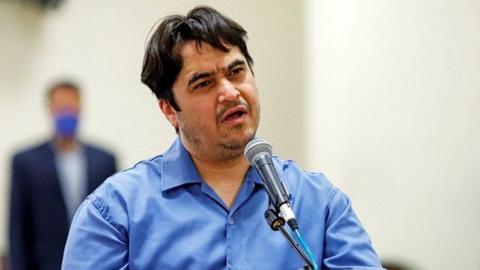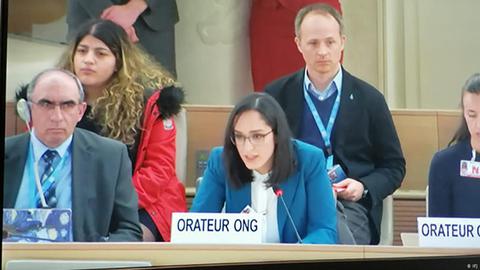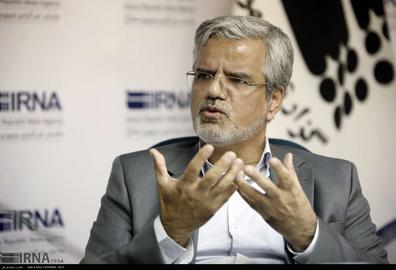BBC Persian journalists have told United Nations experts they continue to receive death threats from Iranian agents, and that a campaign of harassment and intimidation has increased over the last year.
On December 18, lawyers for the BBC Persian journalists filed an Urgent Appeal with three UN experts detailing the death threats and other harassment, including the freezing of assets and intimidation of the journalists’ families.
The appeal to the UN came just days after the execution of Ruhollah Zam, the founder of the Amad News website and Telegram channel, which took place on December 12.
Iranian security forces and Revolutionary Guards operate a policy of terror against journalists, arresting, harassing, intimidating, threatening, abducting and even killing them, as in the case of Ruhollah Zam. Whether based inside the country or out, no journalist is immune. Despite sustained campaigns and appeals from international organizations, governments and activists, these tactics continue.
What happened to Ruhollah Zam has been a tragic reminder of the dangers Iranian journalists face, accompanied by fears that something similar could happen to them too.
Commenting on the appeal to the UN, Michelle Stanistreet, the United Kingdom's National Union of Journalist's general secretary, said, “Journalism is not a crime. The Iranian government must stop targeting journalists and their families. The authorities will never be effective in their attempts to stop quality journalism or reporting in the public interest.”
The journalists’ lawyers, Caoilfhionn Gallagher QC and Jennifer Robinson of Doughty Street Chambers, said in a statement: “It is a matter of grave concern that BBC Persian journalists are receiving death threats simply for doing their jobs. These cross-border threats to the lives and security of journalists are particularly chilling given Iran’s execution of journalist Ruhollah Zam earlier this week. Many more BBC Persian journalists are enduring other forms of systematic harassment, including threats to them and their families, their assets being frozen and abuse online. We call on the international community to condemn these threats and actions in the strongest terms, and to take robust action to ensure that BBC Persian journalists can report without fear.”
One BBC Persian correspondent, who asked not to be named, said he received threatening messages on Twitter on a regular basis, especially when he visited his family living in a neighboring country prior to the outbreak of coronavirus. "They sent me a photo of my house in the neighboring country and said, 'We know where you are, take care of yourself.' He said he was unable to identify who had sent the messages.
In 2017, the Iranian judiciary banned 152 BBC Persian service employees from financial transactions or from accessing, selling or acquiring assets, including property, in Iran. At that time, the BBC stated that Iranian authorities were using the ban as a means of silencing journalists.
A year later, in March 2018, the BBC announced that, for the first time in its history, it was calling on the UN to take action to protect the rights of journalists working for them, and their families. “The BBC is taking the unprecedented step of appealing to the United Nations because our own attempts to persuade the Iranian authorities to end their harassment have been completely ignored,” said BBC Director General Tony Hall. “In fact, during the past nine years, the collective punishment of BBC Persian Service journalists and their families has worsened.”
In March 2020, BBC Persian presenter Rana Rahimpour addressed the UN Human Rights Council, detailing the death threats and other threats she and her family had received.
Just a few months on from this appeal to the UN, threats have started again, including death threats.
Threats Against Other Journalists Based Abroad
It’s not only BBC Persian journalists who face threats from Iranian security agencies. Journalists working for other Persian-language media abroad are also targeted, including journalists working for Radio Farda and Iran International, as have journalists for Voice of America. Although these journalists have not been able to identify who is behind the threats of violence and death and theft of property, it is assumed that the Iranian authorities are responsible.
Siamak Dehghanpour, a former presenter of VOA’s program Ofoq, tweeted on December 15 that his father had been interrogated in the past and been pressured to tell his son to quit his profession. He was also verbally threatened in Turkey when he had gone there to visit family. "A few years ago in Iran, my father was summoned for interrogation to be told through him that I should either leave VOA or leave the show,” he wrote. “My father was told: ‘Siamak's situation is not good for the safety of our family.’”
A second tweet said: "After years away, I went to Turkey to visit my sick father. One night in a restaurant, two people were watching us. One came and said, ‘We know you're not running the program anymore, and that's fine.' Then he turned to my father and family and said, 'Where are you staying? How long are you here?' We said we would be going back that night and I thanked him, and he went to his table."
Following the nationwide protests in November 2019 and the shooting down of the Ukrainian International Airlines plane by the Revolutionary Guards in January 2020, threats against Persian-language media journalists abroad has increased, presumably due to their extensive coverage of these events.
On January 6, 2020, just days after the assassination of Quds Force commander Ghasem Soleimani and two days before the plane tragedy, an article in the British newspaper the Daily Express reported that agents from Iran’s Ministry of Intelligence were trying to kidnap journalists working for Iran International TV, even plotting to abduct them on the street, and take them back to Iran. The report said that agents had directly threatened a number of journalists working for the UK-based independent news channel.
Iran has a long history of kidnapping opposition or dissident figures based abroad, and Ruhollah Zam’s abduction by Revolutionary Guards, which took place in Iraq in 2019, is the most recent high-profile case. Saeed Karimian, director of the Jam TV network, was assassinated in Turkey in 2017. Prior to this, news had surfaced that his family in Iran had been interrogated to apply pressure on Karimian.
Over the last year, journalists including BBC Persian presenter Farnaz Ghazizadeh, Iran International TV presenter Pouya Azizi, Kambiz Hosseini, a satirist and producer of the comedy show Paradox, as well as Marjan Television producer Sanaz Ghazizadeh, have all said on social media that they have been subjected to death threats and threats of arrest, and that their families have also been threatened.
Fine for Hassan Rouhani's Advisor
In January 2020, Iranian and other media reported that Hessamoddin Ashena, an advisor to President Hassan Rouhani and the director of the Center for Strategic Studies, had threatened Iranian journalists abroad. “Iranian-born agents of Persian-language media outlets are warned to refrain from participating in psychological warfare related to the Ukrainian plane, and from cooperating with anti-Iranian enemies,” he tweeted after the the downing of Ukrainian International Airlines flight PS752 earlier that month.
Ashena was tried on November 22 for the threatening tweets, and faced charges of spreading lies. The case was brought against him by the deputy official working in cyberspace department of the Attorney General's Office and the head of the Culture and Media Court.
Because Ashena is a senior adviser to Rouhani and a member of the government, his case was examined as part of a political crimes trial before a jury focusing on press and political crimes. He was found guilty.
Although local media provided scarce information about the evidence used in the trial, Ashena himself tweeted the day before his trial, making reference to the two tweets on which the case focused: the PS752 disaster, and the ongoing trial of Akbar Tabari, former deputy head of the judiciary, on corruption charges.
On December 20, local media reported that his sentence had been commuted to a fine by Branch 9 of the Criminal Court in Tehran province. The amount of the fine has not been made public.
The president's adviser was met with “Islamic kindness” and the commuting of the sentence. But Ruhollah Zam, who reported on protests and other sensitive issues the regime wanted kept secret, was denied a retrial his lawyer had intended to request, was executed just four days after his death sentence was upheld. The Iranian judiciary and other authorities have again shown the world how it operates, and what it is prepared to do for silence.
Related coverage:
Iran Hires Criminals and Drug Dealers to Kidnap Its Opponents
Weekly Review of Censorship: Presidential Advisor Found Guilty by Press Jury
visit the accountability section
In this section of Iran Wire, you can contact the officials and launch your campaign for various problems


























comments